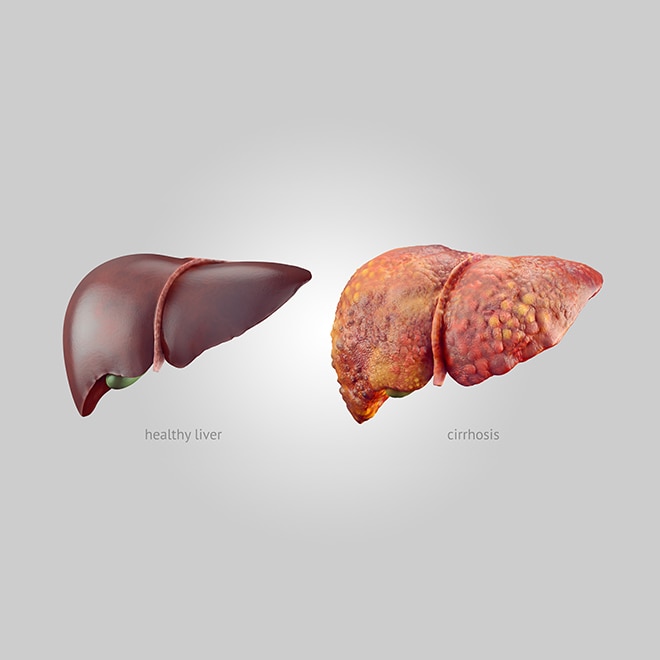Cirrhosis
View or Print All Sections
Definition & Facts
Cirrhosis is a condition in which your liver is scarred and permanently damaged. Scar tissue replaces healthy liver tissue and prevents your liver from working normally. As cirrhosis gets worse, your liver begins to fail.

Symptoms & Causes
Cirrhosis has many signs and symptoms, such as fatigue and severe itchy skin. Symptoms may not appear until the liver is badly damaged. Causes include alcohol-associated liver disease, nonalcoholic fatty liver disease, chronic hepatitis C, and chronic hepatitis B.
Diagnosis
Doctors diagnose cirrhosis based on your medical history, a physical exam, and the results of tests. Tests include blood tests, which can show signs of liver damage or infections; imaging tests; and liver biopsy.
Treatment
Doctors do not have specific treatments that can cure cirrhosis. However, they can treat many of the diseases that cause cirrhosis. Treating the underlying causes of cirrhosis may keep cirrhosis from getting worse and may help prevent liver failure.
Eating, Diet, & Nutrition
If you have cirrhosis, talk with your doctor or a registered dietitian about planning healthy meals. Avoid foods and drinks that can damage the liver, such as raw shellfish and alcohol.
Clinical Trials
NIDDK conducts and supports clinical trials in many diseases and conditions, including liver diseases. The trials look to find new ways to prevent, detect, or treat disease and improve quality of life.
Related Conditions & Diseases
Related Diagnostic Tests
Related Research
See more about liver diseases research at NIDDK.
Your Digestive System & How It Works
The digestive system is made up of the gastrointestinal (GI) tract—also called the digestive tract—and the liver, pancreas, and the gallbladder. The GI tract is a series of hollow organs joined in a long, twisting tube from the mouth to the anus.
This content is provided as a service of the National Institute of Diabetes and Digestive and Kidney Diseases
(NIDDK), part of the National Institutes of Health. NIDDK translates and disseminates research findings to increase knowledge and understanding about health and disease among patients, health professionals, and the public. Content produced by NIDDK is carefully reviewed by NIDDK scientists and other experts.
NIDDK would like to thank:
Bilal Hameed, M.B.B.S., University of California, San Francisco

